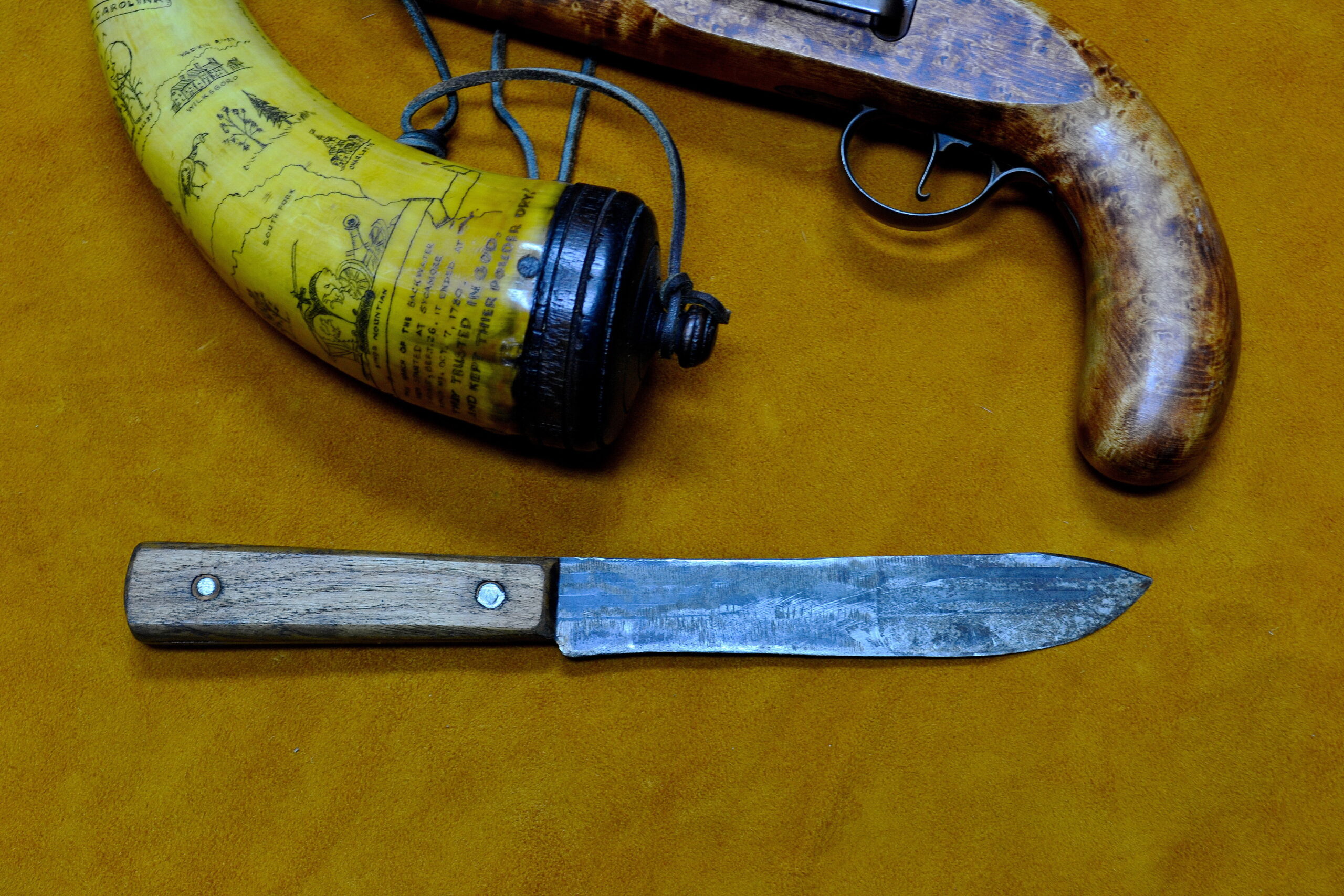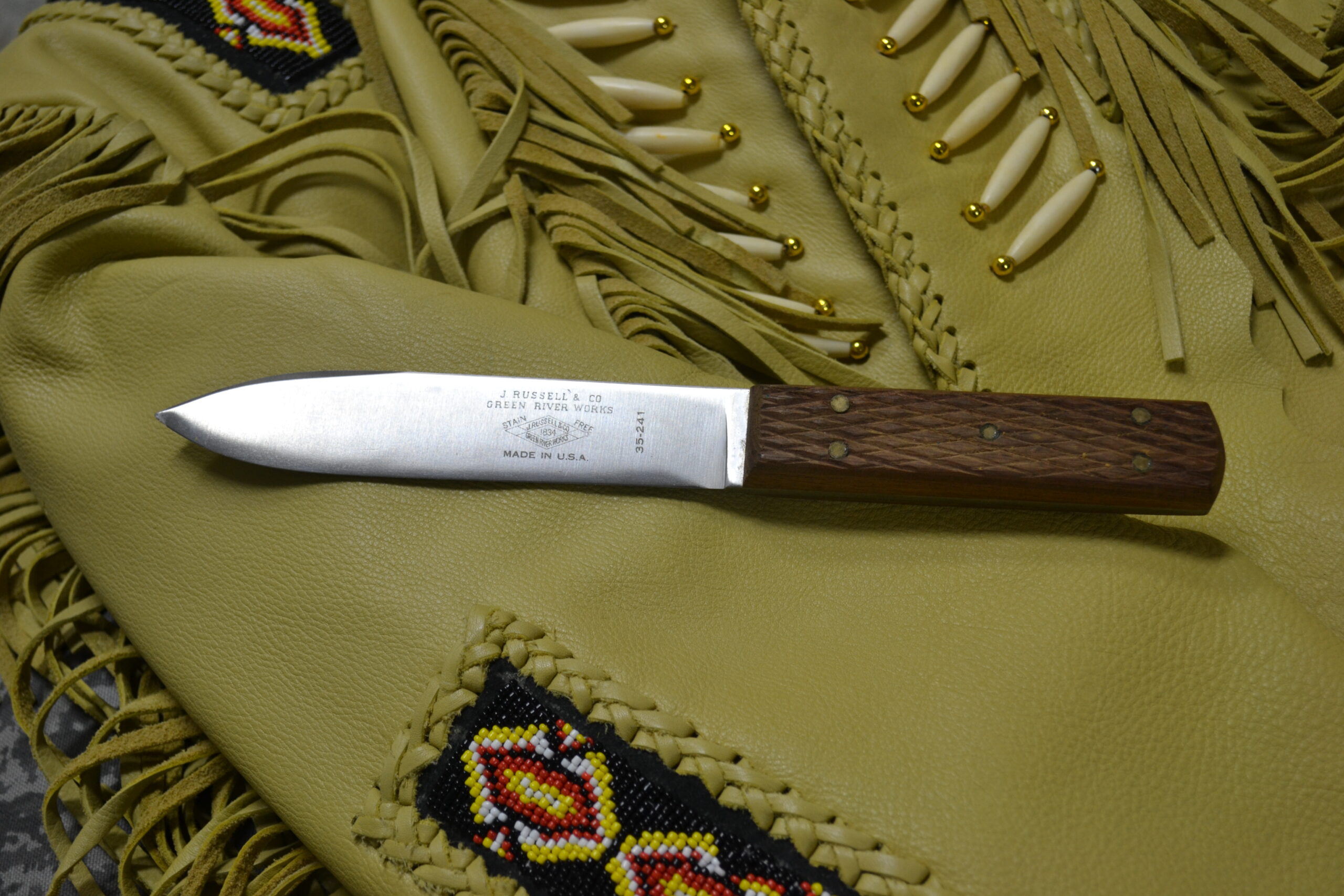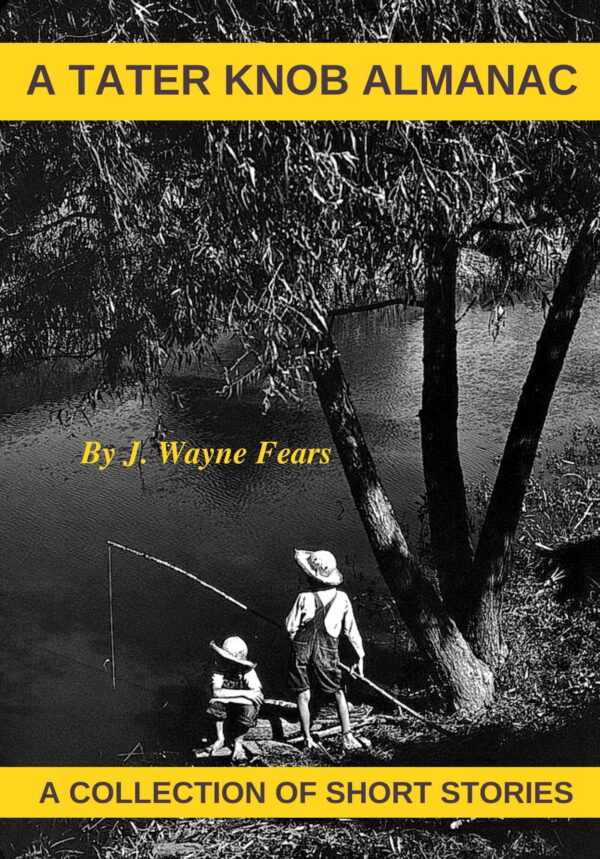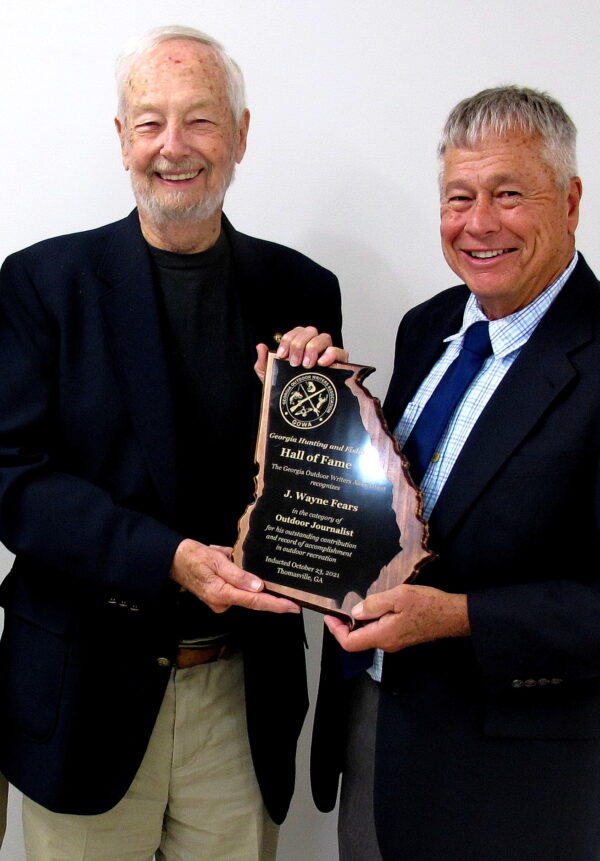
It was the end of a near perfect day. I was working on a wildlife management plan for a large tract of mountainous timberland. Being so involved in my work, the day was ending, and the base camp was three miles away. Finding a suitable campsite and spending the night rather than running the risk of traveling after dark in thick timber and along high cliffs was a must.
I selected a rock shelter that gave me protection from the wind and would be dry in the event of rain. As it was getting dark, I cleaned out a spot, looking to be sure I wasn’t about to spend the night with a copperhead and brought in several armloads of leaves to put under the Mylar emergency sleeping bag I unfolded from my survival kit. After building a fire I ate a couple of strips of jerky and settled into the sleeping bag for a good night’s sleep.
During the night, I felt an insect crawling across my bare belly under my shirt. Without fully awakening, I mashed the critter, felt a slight stick like a brier, and went back to sleep. The next morning, I woke up to feeling somewhat ill and had a burning sensation on my abdomen. Getting out of the sleeping bag, I pulled up my shirt and as the semi-crushed body of a brown recluse spider fell in the dirt at my feet. I knew I was bitten and quickly looked just over my belly button to see the bite wound with a dark red ring around it.
The next few weeks were exciting as the bite quickly became ulcerated and I lost a large chunk of tissue resulting in a permanent scar just above my navel. I have been bitten once more since that adventure with a more severe reaction. I have one of those whose immune systems that is not tolerant of the brown recluse venom.
The brown recluse is just one of three dangerous venomous spiders found in the U.S. and southern Canada. The other two are the black widow and the hobo spider, which is still under study to see just how dangerous its bite may or may not be.
Many spiders common in the U.S. and Canada are somewhat venomous. Due to their small size, short fangs or small mouth, they do not bite us at all when we encounter them. If they do, it is not life threatening or very painful. For this article, we will discuss the three whose bites could be dangerous.
If you live, work, or play where these three spiders are found, chances are good you are in close contact with them daily and don’t even know it. For example, a rural home in Kansas was studied by entomologist. During a six-month period, 2,055 brown recluse spiders were either collected or killed. No one in the family that lived in the home had ever been bitten.
Rural homesteads are havens for venomous spiders due to the natural supply of insects they depend upon and to the vast number of places to live out of sight of man.
Fortunately, the three spiders discussed here are considered non-aggressive and stay hidden most of the time. Most bites occur because the spider is trapped or unintentionally handled. On the plus side, it is estimated by entomologists that at least 15% of the bites from these spiders are “dry bites,” that is, no venom is injected.
While everyone’s immune system reacts differently to a spider bite, symptoms can range anywhere from slight sting to death.
Brown recluse

The range of the brown recluse is said to be from Nebraska to Ohio and across the south from Texas to Florida, but these spiders have been confirmed in other states due to people moving household goods and supplies that contain spiders. These spiders establish new isolated populations.
The brown recluse is a medium-sized spider with leg span from 0.8 to 1.6 -inches and a color range from yellow tan to dark brown. The most distinguishing characteristics – six eyes (most spiders have eight eyes) arranged a semicircle of three pairs on top of the head, and a violin-shaped marking extending from the area of the eyes to the abdomen.
Egg-laying primarily occurs from May through July. The female lays about 50 eggs that are encased in an off-white silken sac that is about 2/3-inch diameter. Each female may produce several egg sacs over a period of several months. Tiny spiders emerge from the egg sac in about a month or less. Their development is slow. It takes an average of one year to reach the adult stage from time of egg deposit. Adult brown recluse spiders often live about one to two years. They can survive 6 months without food or water.
The brown recluse spider spins a loose, irregular web of very sticky, off-white to grayish threads. This web serves as the spider’s daytime retreat, and it often is constructed in an undisturbed corner. This spider roams at night searching for insect prey. Recent research indicates that the brown recluse spider is largely a scavenger, preferring dead insects. Mature males travel at night in search of females.
Brown recluse spiders may be found indoors or outdoors. In favorable habitats, their numbers are usually high. They often thrive in older buildings, woodsheds, logs, stacks of lumber, rock piles, outbuildings, storage boxes, unused shoes, stored clothing and behind furniture.
The brown recluse spider normally bites only when crushed, handled or disturbed. Some people have been bitten in bed after rolling over onto the spider. Others have been bitten after accidentally touching the spider when moving boxes in their garage. Some bites occur when people put on little used clothing or shoes inhabited by a brown recluse.
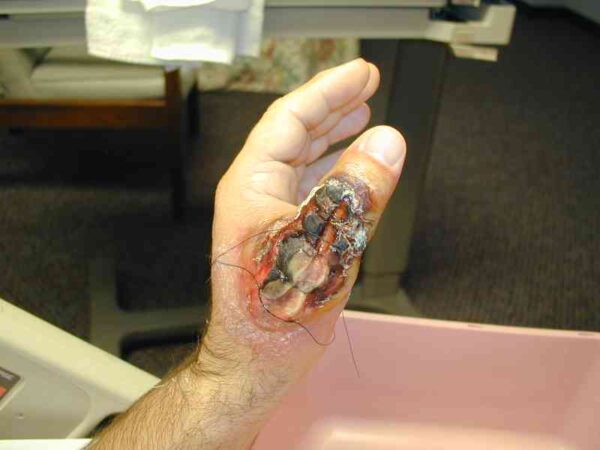
The bite of this spider can result in a painful, deep wound that takes months to heal. Death from a bite is rare, but bites are most dangerous to young children, the elderly, and those in poor physical condition. If there is a severe reaction to the bite, the bite site can erupt into a deep lesion. The wound may range from the size of a dime to the size of a softball. The dead tissue peels away, exposing underlying tissues. The sunken, ulcerating sore may heal slowly taking up to two months. Full recovery may take several months, and scarring may be a reminder.
Black widow
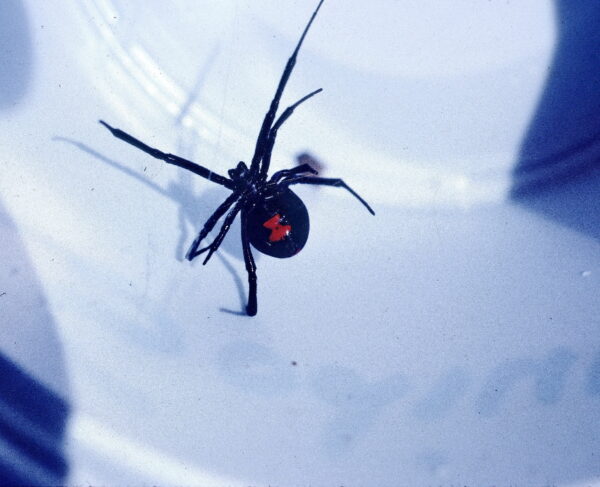
The black widow is found throughout North America except in northern Canada and in Alaska. Most reported human fatalities have occurred in the southeastern states. In 1954, an antivenom was approved for use on black widow bites. It has been estimated that prior to the availability of the antivenom approximately 5 % of the black widow bites were serious to fatal. An old rural doctor who made many homestead house calls prior to 1960 once told me in an interview that many of his calls were to farms which used the old fashion outhouse. He said that the black widow spider found an easy place to catch flies – it was to build a web just under the outhouse seat. Men using the outhouse were often bitten on the genitals.
The venomous female black widow has a shiny black body, approximately 0.6- inch long, and usually a red hourglass-shaped mark on the underside of her globular abdomen. On some, the hourglass marking is replaced with several triangles or spots or an irregular longitudinal blotch. I have seen some that the red was barely visible. She has slim black legs with a span of 1.5- inches. The less venomous male is smaller than the female and usually is a patterned brown color.
The female lays several batches of eggs, containing up to 750 eggs each, in one summer. The egg case, about .5- inch in diameter, is suspended in the web. It is white to sand in color and has a paper-like texture. There may be four to nine egg sacs produced during a summer. Young black widows are colored orange and white when they emerge 1 to 4 weeks later. Normally, only one to twelve young survive after the egg incubation period of 14 to 30 days, due to cannibalism by their hungry siblings.
The black widow spider may be found under stones, loose bark, in water meters, under outhouse seats, near water faucets, in woodpiles, vacant wildlife burrows, garages, storage buildings, well houses, root cellars, and barns. I have seen them nest in sagebrush in New Mexico, under a children’s plastic wading pool in New York and in a hollow opening in a tree in Louisiana.
As stated above, the black widow spider is not aggressive. Years ago, one of my sons, then 5 years old, brought me the largest black widow I have ever seen. He was holding it by one leg of the big spider and calling it a “baby octopus”. To my pleasant surprise the spider made no attempt to bite him.
Because its venom is reported to be 15 times stronger than a rattlesnake’s, the black widow is feared by many. However, even when it bites, it injects a small amount of its potent venom, sometimes none. The bite can produce nausea, muscle aches and a paralysis of the diaphragm that can make breathing difficult.
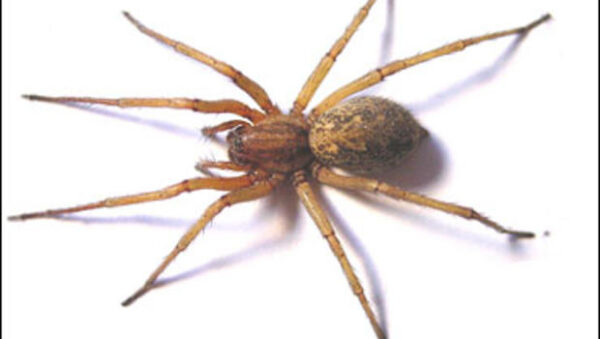
Hobo Spider
A relatively newcomer to the biting spiders of North America is the hobo spider. It is questionable as to how venomous this spider really is. It is found in southern British Columbia, Washington, Oregon, Idaho, western Montana, western Wyoming and northern Utah, probably soon in northern California. It was introduced accidentally into the U.S. in the early 1900’s from Europe.
The hobo spider has a brown front body region where the legs are attached and brown legs. The abdomen has a distinctive pattern of yellow markings on a grey background, although this pattern can be difficult to discern without the aid of a microscope or hand lens. Unlike many other similar-looking spiders, hobo spiders do not have dark bands on their legs. Spiders with such banding are not hobo spiders.
Mature female hobo spiders are 3/8-5/8- inches long, and male hobo spiders are 9/32-9/16- inches in body length. Males have enlarged pedipalps located near the mouth, resembling short legs.
According to the Utah State University Extension Service, “hobo spider eggs deposited in the fall begin hatching in the spring. The spiderlings will molt (shed their skin) once before breaking free from the egg sac around early June. The juvenile hobo spiders grow and develop over the summer (or several summers) and will overwinter again before reaching maturity the following year. Males and females will mature from June to September. Males seek out females for mating during the summer and most die before October. Mated females start laying eggs in mid-September, with one to four egg sacs produced over a period of four weeks. Fewer eggs are produced if food is limited or if temperatures are cooler than normal. Cold temperatures eventually terminate the production of eggs by the females. Most females will die in late autumn, but some may overwinter and live into the following summer.”
Hobo spiders’ frequent areas such as log or timber piles, rock piles, holes in logs/trees, or where tall grass meets crevices in soil where they can make their characteristic funnel webs. The webs are funnel shaped, narrow at the bottom, wide at the top. The spider waits in the small hole at the bottom of the funnel for prey to contact the web. When it senses a vibration, it will emerge from the hole to bite its prey.
The hobo spider, which has difficulty climbing, has a reputation of being an aggressive spider but experts tell me that the spider is near blind and often when frightened it will run towards the person because it can’t see very good, giving the impression that it is aggressive. The hobo, like the two dangerous spiders mentioned above, tends to avoid humans.
Just how venomous a bite from a hobo spider can be is still under study. In fact, where they are found in Europe are not listed as dangerous. It is recorded that a bite from a hobo spider can be painful. Usually, bites occur when it is in clothing or other areas where the skin of a person is pushing up against it. There are still many studies in place to determine the potency of these spiders. However, there is lots of conflicting information.
Protect your homestead from dangerous spiders
Here are some tips from the experts as to how to protect your homestead from spiders:
• Use tight-fitting screens on windows and doors. Seal small cracks and openings to your house using caulk or other sealants. Check under outside doors for a tight fit.
• Vacuum regularly, especially around door and window frames, behind furniture, and along ceiling and floor edges. Vacuum up any spiders that make it inside and dispose of them outside in a sealed bag.
• Clear away clutter, such as old furniture, boxes, or clothes that sit in undisturbed areas of your home, shop or garage.
• Keep spiders from crawling into bed with you by moving beds away from walls, and removing dust ruffles that reach the floor, and items stored under the bed.
• Inspect firewood, potted plants, and other objects before bringing them inside.
• Keep wood piles, rock piles, shrubbery, and other objects away from the outer walls of your home.
• Remove spiders and their webs from the foundation, eaves, windows, and door frames around your home.
• Wear a long-sleeved shirt and pants, hat, gloves, and shoes when handling stored firewood or boxes, and when cleaning out sheds, garages, barns, basements, attics, and crawl spaces.
• Shake out and check clothing and shoes for spiders before putting them on – especially if the clothes are stored or hung in the garage, shed, or barn. I once got my fishing waders from my garage to find a black widow had taken up residence in them. Store apparel and outdoor equipment in tightly closed plastic bags.
• If a spider gets on you, brush it off. Don’t mash it. Many bites occur when a spider is pressed up against our skin.
• Controlling spiders is not easy. Chemical insecticides are not very effective against spiders, nor do the spiders readily pick up sprays or powders. So just spraying is not a great defense against spiders. With their long legs, spiders keep their abdomen well above the ground, so sprayed insecticide residue on a surface will only touch their feet. But they don’t have a circulatory system that will carry the insecticide from the bottoms of their feet to the organs in their bodies that would cause them to die. Spider control needs to be a compound that comes in contact with the spider body.
• Get rid of other bugs. Cut out the spider’s food supply.
If bitten by a spider
If you’re bitten by a venomous spider, you may notice any, or almost none, of the following as spider bites effect different people differently:
• Intense pain at the site of the wound
• Stiffness or joint pain
• Muscle spasms
• Abdominal pain, nausea or vomiting
• Fever or chills
• Difficulty breathing or swallowing
• A wound that spreads or turns into a sore, an ulcerating sore if a brown recluse bite.
• Dizziness
• Difficulty speaking
• Convulsions
Treatment of venomous spider bites:
• Call your doctor or Poison Control Center for instructions
• Wash the bite area with soap and water.
• Elevate the area to prevent spread of the venom.
• If possible, catch the spider and place in a small bottle of rubbing alcohol for identification by medical personnel.
• Always seek immediate emergency medical care. An anti-venom medication is sometimes given for black widow spider bites. An antivenom has not been approved for use on brown recluse victims at this writing. In extreme cases hospitalization is required after black widow, brown recluse.
• Keep your tetanus boosters up to date, every 10 years. Spider bites can become infected with tetanus spores.
Bites from some other spiders can be painful and can lead to infections, but they do not pose the hazard of toxins associated with the brown recluse, black widow or possibly the hobo spiders. Most of us live with venomous spiders whether we know it or not. The good thing is these spiders want to avoid us as much as we do them. That is the reason, on average, only 6 people, usually infants or elderly die from a venomous spider bite annually in the U.S.

